HRM Report: Learning Culture, Management, Development, and Tesco
VerifiedAdded on 2023/01/18
|10
|3242
|78
Report
AI Summary
This report delves into the realm of Human Resource Management (HRM), focusing on the critical role of a true learning culture in fostering organizational sustainability and competitive advantage, particularly within the context of Tesco. The report begins with a reflective statement exploring employee engagement, systems management theory, and diversity and inclusion. The management report then examines the benefits and challenges of line managers in promoting continuous employee development, the impact of a learning culture on organizational success, and recommendations for senior management to encourage a learning environment. The report emphasizes the importance of employee engagement, the impact of line managers on employee development, and the significance of fostering a learning culture to achieve organizational goals. It provides insights into how companies like Tesco can leverage HRM practices to enhance performance, sustainability, and competitive advantage. The report concludes with recommendations for senior management to create a true learning culture, ensuring that employees are continuously developing and contributing to the organization's success. The report highlights the significance of HRM in building a successful and sustainable business model.
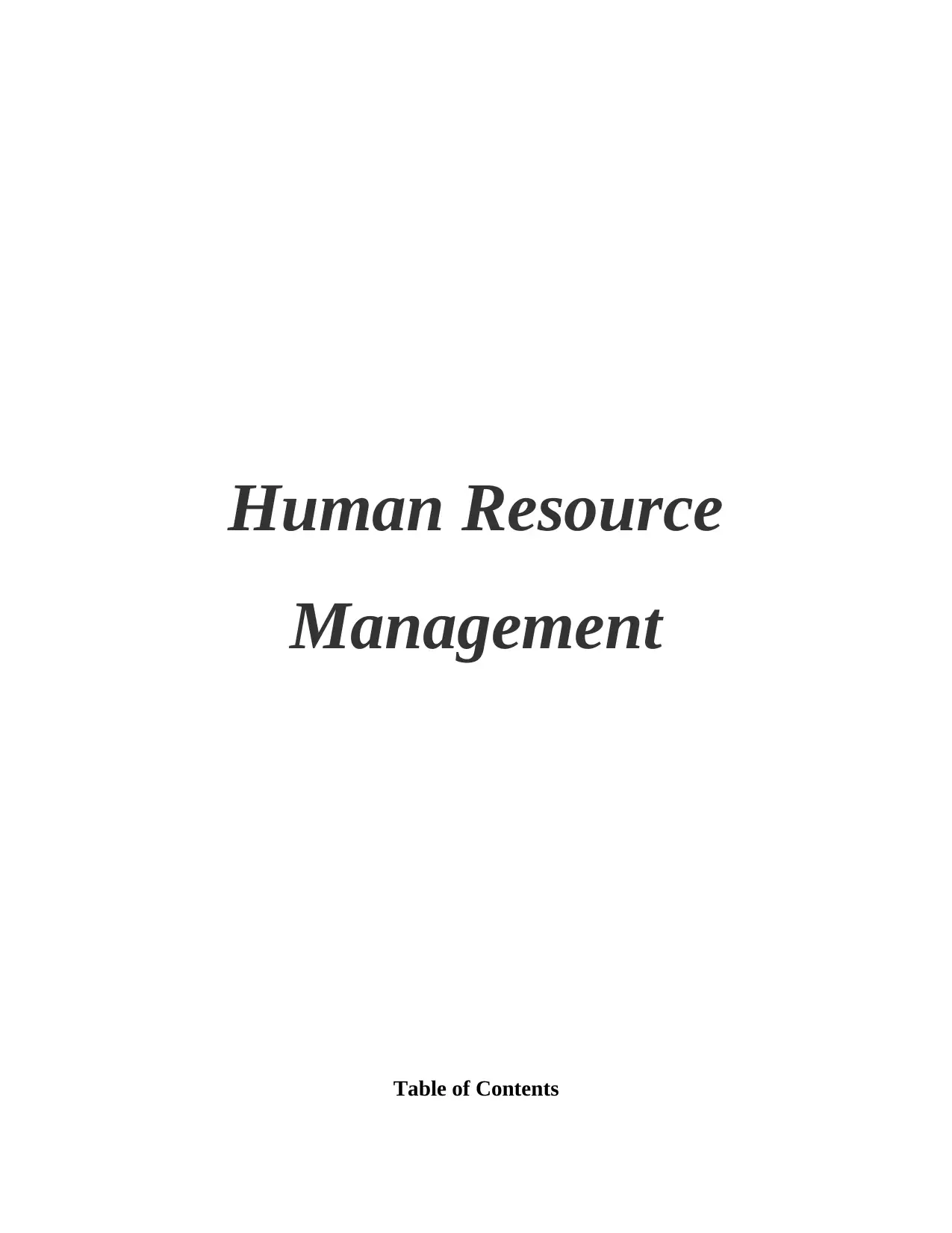
Human Resource
Management
Table of Contents
Management
Table of Contents
Paraphrase This Document
Need a fresh take? Get an instant paraphrase of this document with our AI Paraphraser
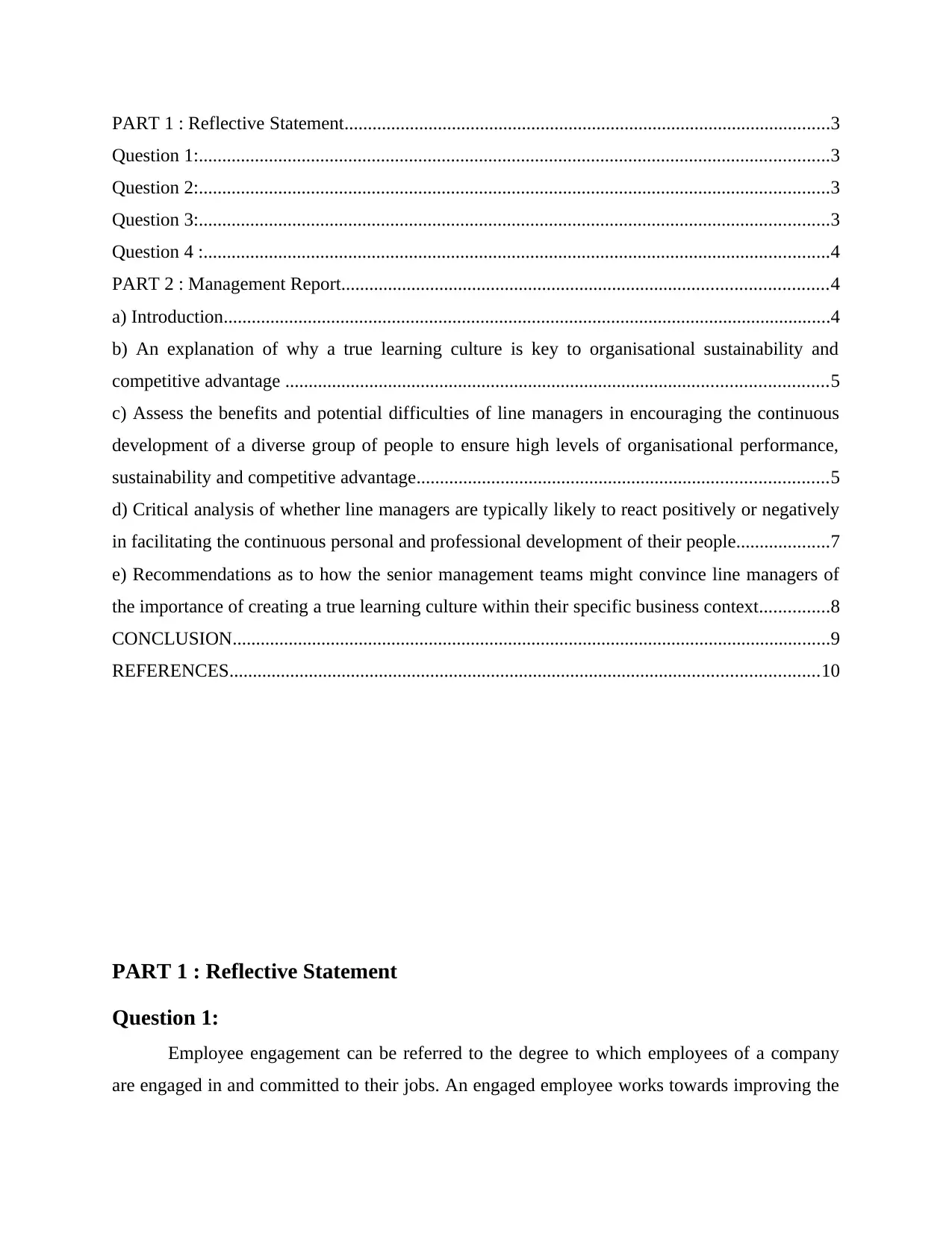
PART 1 : Reflective Statement........................................................................................................3
Question 1:.......................................................................................................................................3
Question 2:.......................................................................................................................................3
Question 3:.......................................................................................................................................3
Question 4 :......................................................................................................................................4
PART 2 : Management Report........................................................................................................4
a) Introduction..................................................................................................................................4
b) An explanation of why a true learning culture is key to organisational sustainability and
competitive advantage ....................................................................................................................5
c) Assess the benefits and potential difficulties of line managers in encouraging the continuous
development of a diverse group of people to ensure high levels of organisational performance,
sustainability and competitive advantage........................................................................................5
d) Critical analysis of whether line managers are typically likely to react positively or negatively
in facilitating the continuous personal and professional development of their people....................7
e) Recommendations as to how the senior management teams might convince line managers of
the importance of creating a true learning culture within their specific business context...............8
CONCLUSION................................................................................................................................9
REFERENCES..............................................................................................................................10
PART 1 : Reflective Statement
Question 1:
Employee engagement can be referred to the degree to which employees of a company
are engaged in and committed to their jobs. An engaged employee works towards improving the
Question 1:.......................................................................................................................................3
Question 2:.......................................................................................................................................3
Question 3:.......................................................................................................................................3
Question 4 :......................................................................................................................................4
PART 2 : Management Report........................................................................................................4
a) Introduction..................................................................................................................................4
b) An explanation of why a true learning culture is key to organisational sustainability and
competitive advantage ....................................................................................................................5
c) Assess the benefits and potential difficulties of line managers in encouraging the continuous
development of a diverse group of people to ensure high levels of organisational performance,
sustainability and competitive advantage........................................................................................5
d) Critical analysis of whether line managers are typically likely to react positively or negatively
in facilitating the continuous personal and professional development of their people....................7
e) Recommendations as to how the senior management teams might convince line managers of
the importance of creating a true learning culture within their specific business context...............8
CONCLUSION................................................................................................................................9
REFERENCES..............................................................................................................................10
PART 1 : Reflective Statement
Question 1:
Employee engagement can be referred to the degree to which employees of a company
are engaged in and committed to their jobs. An engaged employee works towards improving the
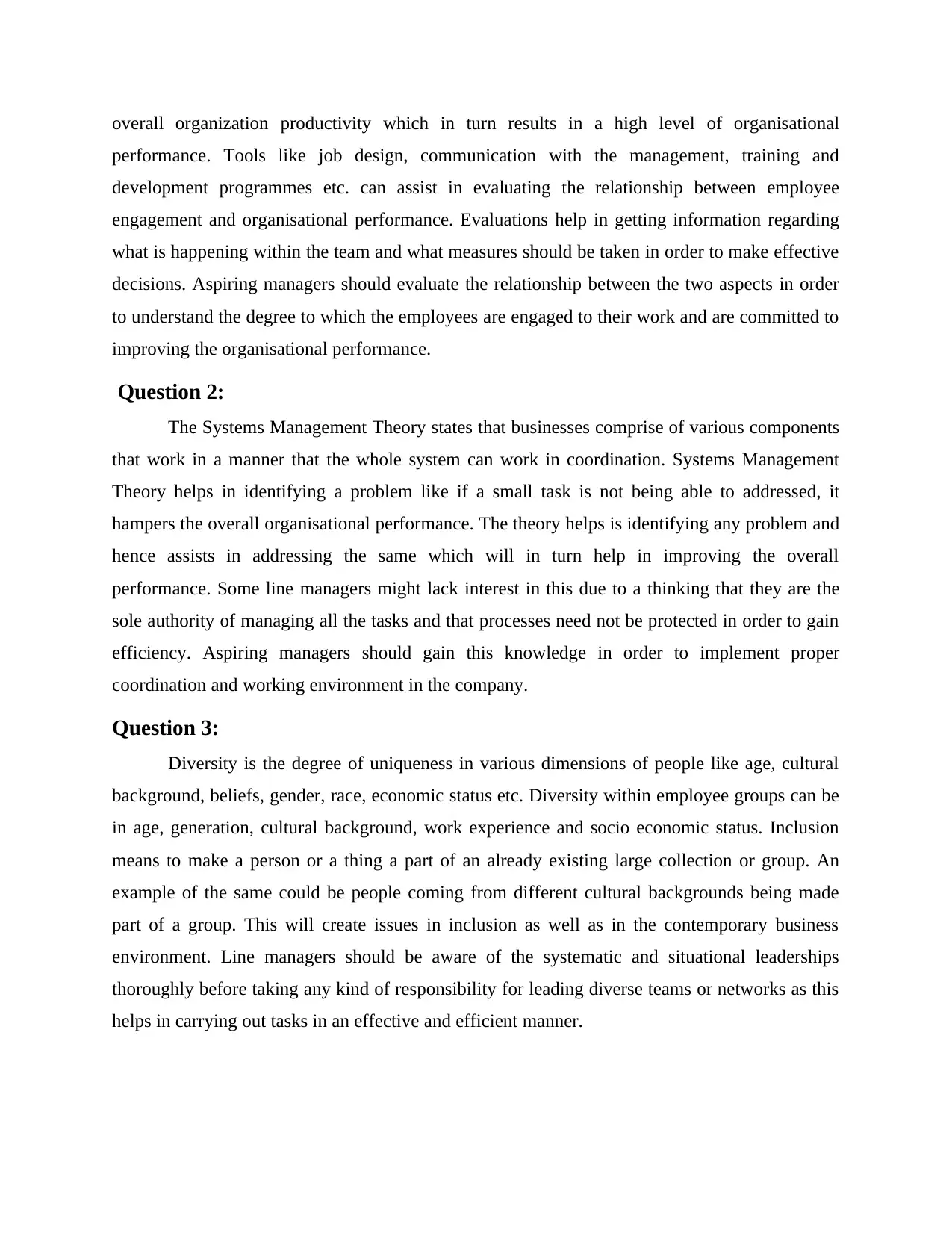
overall organization productivity which in turn results in a high level of organisational
performance. Tools like job design, communication with the management, training and
development programmes etc. can assist in evaluating the relationship between employee
engagement and organisational performance. Evaluations help in getting information regarding
what is happening within the team and what measures should be taken in order to make effective
decisions. Aspiring managers should evaluate the relationship between the two aspects in order
to understand the degree to which the employees are engaged to their work and are committed to
improving the organisational performance.
Question 2:
The Systems Management Theory states that businesses comprise of various components
that work in a manner that the whole system can work in coordination. Systems Management
Theory helps in identifying a problem like if a small task is not being able to addressed, it
hampers the overall organisational performance. The theory helps is identifying any problem and
hence assists in addressing the same which will in turn help in improving the overall
performance. Some line managers might lack interest in this due to a thinking that they are the
sole authority of managing all the tasks and that processes need not be protected in order to gain
efficiency. Aspiring managers should gain this knowledge in order to implement proper
coordination and working environment in the company.
Question 3:
Diversity is the degree of uniqueness in various dimensions of people like age, cultural
background, beliefs, gender, race, economic status etc. Diversity within employee groups can be
in age, generation, cultural background, work experience and socio economic status. Inclusion
means to make a person or a thing a part of an already existing large collection or group. An
example of the same could be people coming from different cultural backgrounds being made
part of a group. This will create issues in inclusion as well as in the contemporary business
environment. Line managers should be aware of the systematic and situational leaderships
thoroughly before taking any kind of responsibility for leading diverse teams or networks as this
helps in carrying out tasks in an effective and efficient manner.
performance. Tools like job design, communication with the management, training and
development programmes etc. can assist in evaluating the relationship between employee
engagement and organisational performance. Evaluations help in getting information regarding
what is happening within the team and what measures should be taken in order to make effective
decisions. Aspiring managers should evaluate the relationship between the two aspects in order
to understand the degree to which the employees are engaged to their work and are committed to
improving the organisational performance.
Question 2:
The Systems Management Theory states that businesses comprise of various components
that work in a manner that the whole system can work in coordination. Systems Management
Theory helps in identifying a problem like if a small task is not being able to addressed, it
hampers the overall organisational performance. The theory helps is identifying any problem and
hence assists in addressing the same which will in turn help in improving the overall
performance. Some line managers might lack interest in this due to a thinking that they are the
sole authority of managing all the tasks and that processes need not be protected in order to gain
efficiency. Aspiring managers should gain this knowledge in order to implement proper
coordination and working environment in the company.
Question 3:
Diversity is the degree of uniqueness in various dimensions of people like age, cultural
background, beliefs, gender, race, economic status etc. Diversity within employee groups can be
in age, generation, cultural background, work experience and socio economic status. Inclusion
means to make a person or a thing a part of an already existing large collection or group. An
example of the same could be people coming from different cultural backgrounds being made
part of a group. This will create issues in inclusion as well as in the contemporary business
environment. Line managers should be aware of the systematic and situational leaderships
thoroughly before taking any kind of responsibility for leading diverse teams or networks as this
helps in carrying out tasks in an effective and efficient manner.
⊘ This is a preview!⊘
Do you want full access?
Subscribe today to unlock all pages.

Trusted by 1+ million students worldwide
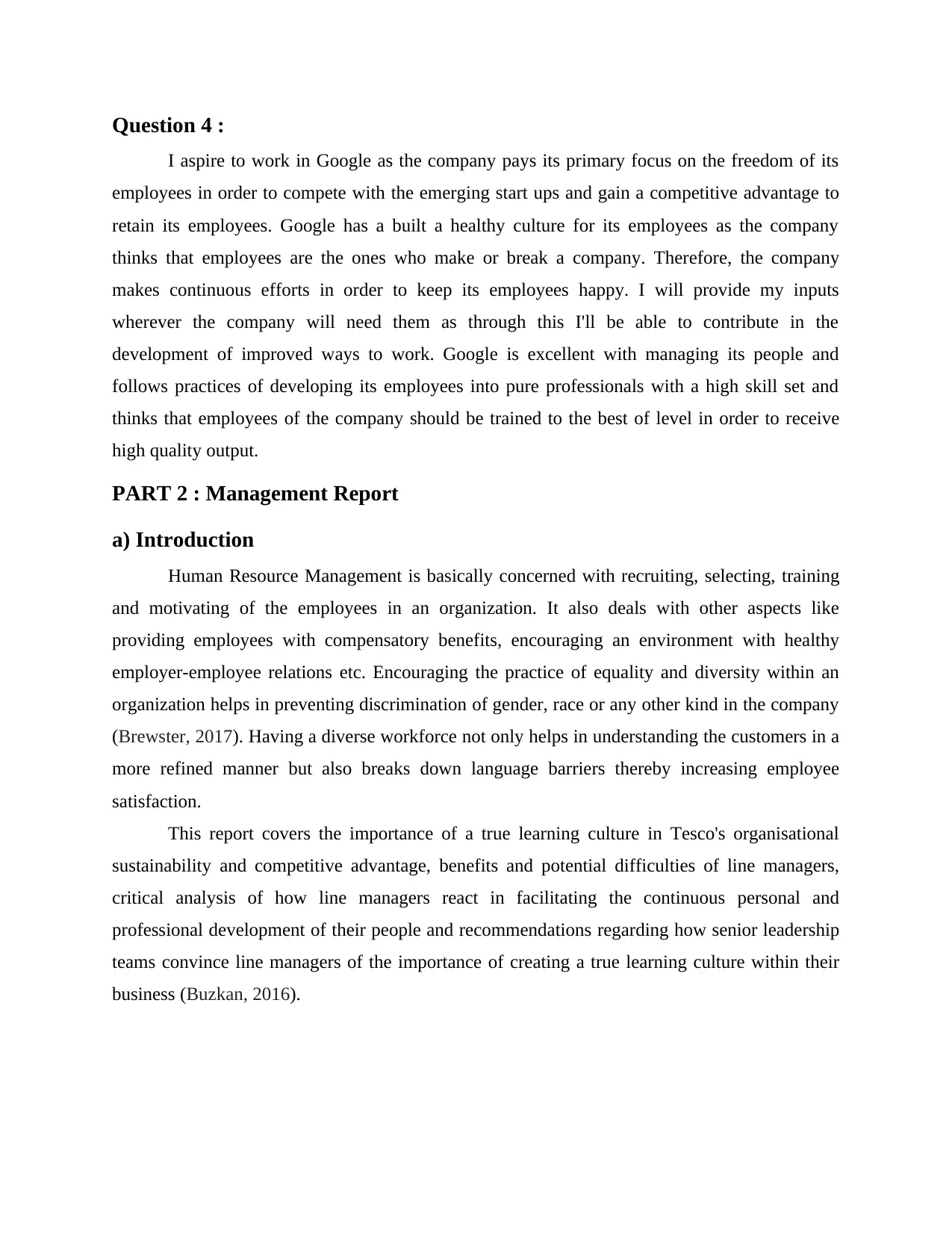
Question 4 :
I aspire to work in Google as the company pays its primary focus on the freedom of its
employees in order to compete with the emerging start ups and gain a competitive advantage to
retain its employees. Google has a built a healthy culture for its employees as the company
thinks that employees are the ones who make or break a company. Therefore, the company
makes continuous efforts in order to keep its employees happy. I will provide my inputs
wherever the company will need them as through this I'll be able to contribute in the
development of improved ways to work. Google is excellent with managing its people and
follows practices of developing its employees into pure professionals with a high skill set and
thinks that employees of the company should be trained to the best of level in order to receive
high quality output.
PART 2 : Management Report
a) Introduction
Human Resource Management is basically concerned with recruiting, selecting, training
and motivating of the employees in an organization. It also deals with other aspects like
providing employees with compensatory benefits, encouraging an environment with healthy
employer-employee relations etc. Encouraging the practice of equality and diversity within an
organization helps in preventing discrimination of gender, race or any other kind in the company
(Brewster, 2017). Having a diverse workforce not only helps in understanding the customers in a
more refined manner but also breaks down language barriers thereby increasing employee
satisfaction.
This report covers the importance of a true learning culture in Tesco's organisational
sustainability and competitive advantage, benefits and potential difficulties of line managers,
critical analysis of how line managers react in facilitating the continuous personal and
professional development of their people and recommendations regarding how senior leadership
teams convince line managers of the importance of creating a true learning culture within their
business (Buzkan, 2016).
I aspire to work in Google as the company pays its primary focus on the freedom of its
employees in order to compete with the emerging start ups and gain a competitive advantage to
retain its employees. Google has a built a healthy culture for its employees as the company
thinks that employees are the ones who make or break a company. Therefore, the company
makes continuous efforts in order to keep its employees happy. I will provide my inputs
wherever the company will need them as through this I'll be able to contribute in the
development of improved ways to work. Google is excellent with managing its people and
follows practices of developing its employees into pure professionals with a high skill set and
thinks that employees of the company should be trained to the best of level in order to receive
high quality output.
PART 2 : Management Report
a) Introduction
Human Resource Management is basically concerned with recruiting, selecting, training
and motivating of the employees in an organization. It also deals with other aspects like
providing employees with compensatory benefits, encouraging an environment with healthy
employer-employee relations etc. Encouraging the practice of equality and diversity within an
organization helps in preventing discrimination of gender, race or any other kind in the company
(Brewster, 2017). Having a diverse workforce not only helps in understanding the customers in a
more refined manner but also breaks down language barriers thereby increasing employee
satisfaction.
This report covers the importance of a true learning culture in Tesco's organisational
sustainability and competitive advantage, benefits and potential difficulties of line managers,
critical analysis of how line managers react in facilitating the continuous personal and
professional development of their people and recommendations regarding how senior leadership
teams convince line managers of the importance of creating a true learning culture within their
business (Buzkan, 2016).
Paraphrase This Document
Need a fresh take? Get an instant paraphrase of this document with our AI Paraphraser
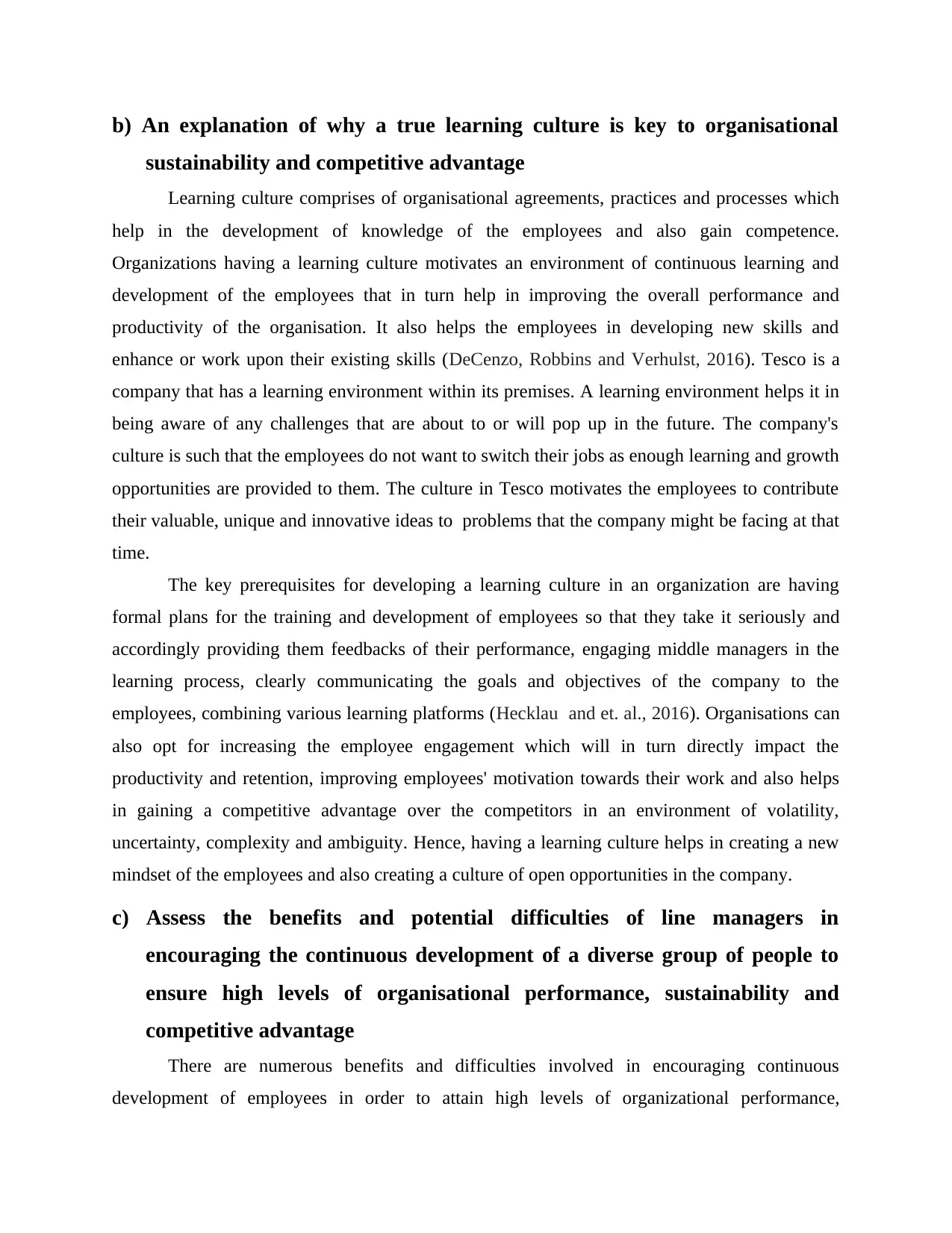
b) An explanation of why a true learning culture is key to organisational
sustainability and competitive advantage
Learning culture comprises of organisational agreements, practices and processes which
help in the development of knowledge of the employees and also gain competence.
Organizations having a learning culture motivates an environment of continuous learning and
development of the employees that in turn help in improving the overall performance and
productivity of the organisation. It also helps the employees in developing new skills and
enhance or work upon their existing skills (DeCenzo, Robbins and Verhulst, 2016). Tesco is a
company that has a learning environment within its premises. A learning environment helps it in
being aware of any challenges that are about to or will pop up in the future. The company's
culture is such that the employees do not want to switch their jobs as enough learning and growth
opportunities are provided to them. The culture in Tesco motivates the employees to contribute
their valuable, unique and innovative ideas to problems that the company might be facing at that
time.
The key prerequisites for developing a learning culture in an organization are having
formal plans for the training and development of employees so that they take it seriously and
accordingly providing them feedbacks of their performance, engaging middle managers in the
learning process, clearly communicating the goals and objectives of the company to the
employees, combining various learning platforms (Hecklau and et. al., 2016). Organisations can
also opt for increasing the employee engagement which will in turn directly impact the
productivity and retention, improving employees' motivation towards their work and also helps
in gaining a competitive advantage over the competitors in an environment of volatility,
uncertainty, complexity and ambiguity. Hence, having a learning culture helps in creating a new
mindset of the employees and also creating a culture of open opportunities in the company.
c) Assess the benefits and potential difficulties of line managers in
encouraging the continuous development of a diverse group of people to
ensure high levels of organisational performance, sustainability and
competitive advantage
There are numerous benefits and difficulties involved in encouraging continuous
development of employees in order to attain high levels of organizational performance,
sustainability and competitive advantage
Learning culture comprises of organisational agreements, practices and processes which
help in the development of knowledge of the employees and also gain competence.
Organizations having a learning culture motivates an environment of continuous learning and
development of the employees that in turn help in improving the overall performance and
productivity of the organisation. It also helps the employees in developing new skills and
enhance or work upon their existing skills (DeCenzo, Robbins and Verhulst, 2016). Tesco is a
company that has a learning environment within its premises. A learning environment helps it in
being aware of any challenges that are about to or will pop up in the future. The company's
culture is such that the employees do not want to switch their jobs as enough learning and growth
opportunities are provided to them. The culture in Tesco motivates the employees to contribute
their valuable, unique and innovative ideas to problems that the company might be facing at that
time.
The key prerequisites for developing a learning culture in an organization are having
formal plans for the training and development of employees so that they take it seriously and
accordingly providing them feedbacks of their performance, engaging middle managers in the
learning process, clearly communicating the goals and objectives of the company to the
employees, combining various learning platforms (Hecklau and et. al., 2016). Organisations can
also opt for increasing the employee engagement which will in turn directly impact the
productivity and retention, improving employees' motivation towards their work and also helps
in gaining a competitive advantage over the competitors in an environment of volatility,
uncertainty, complexity and ambiguity. Hence, having a learning culture helps in creating a new
mindset of the employees and also creating a culture of open opportunities in the company.
c) Assess the benefits and potential difficulties of line managers in
encouraging the continuous development of a diverse group of people to
ensure high levels of organisational performance, sustainability and
competitive advantage
There are numerous benefits and difficulties involved in encouraging continuous
development of employees in order to attain high levels of organizational performance,
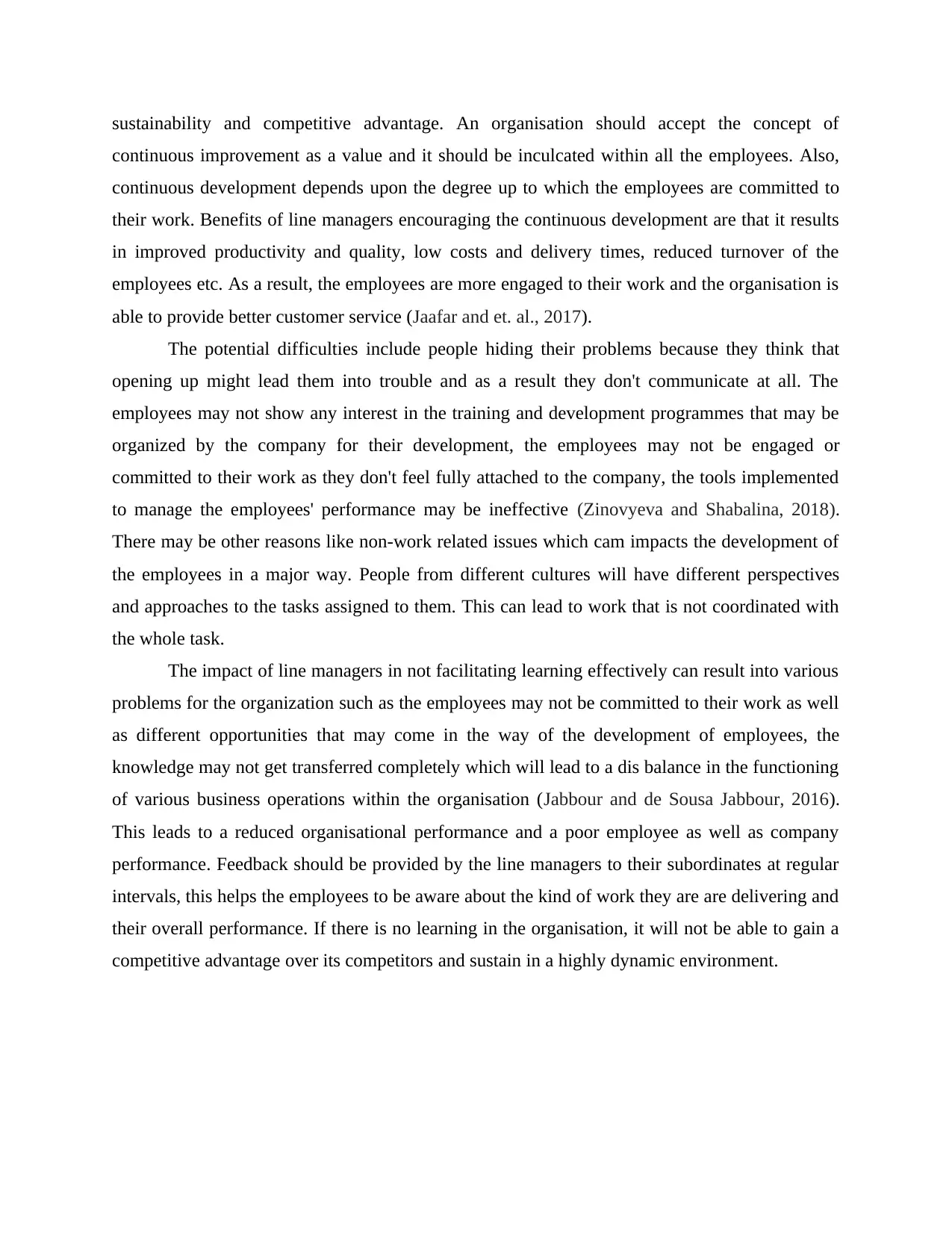
sustainability and competitive advantage. An organisation should accept the concept of
continuous improvement as a value and it should be inculcated within all the employees. Also,
continuous development depends upon the degree up to which the employees are committed to
their work. Benefits of line managers encouraging the continuous development are that it results
in improved productivity and quality, low costs and delivery times, reduced turnover of the
employees etc. As a result, the employees are more engaged to their work and the organisation is
able to provide better customer service (Jaafar and et. al., 2017).
The potential difficulties include people hiding their problems because they think that
opening up might lead them into trouble and as a result they don't communicate at all. The
employees may not show any interest in the training and development programmes that may be
organized by the company for their development, the employees may not be engaged or
committed to their work as they don't feel fully attached to the company, the tools implemented
to manage the employees' performance may be ineffective (Zinovyeva and Shabalina, 2018).
There may be other reasons like non-work related issues which cam impacts the development of
the employees in a major way. People from different cultures will have different perspectives
and approaches to the tasks assigned to them. This can lead to work that is not coordinated with
the whole task.
The impact of line managers in not facilitating learning effectively can result into various
problems for the organization such as the employees may not be committed to their work as well
as different opportunities that may come in the way of the development of employees, the
knowledge may not get transferred completely which will lead to a dis balance in the functioning
of various business operations within the organisation (Jabbour and de Sousa Jabbour, 2016).
This leads to a reduced organisational performance and a poor employee as well as company
performance. Feedback should be provided by the line managers to their subordinates at regular
intervals, this helps the employees to be aware about the kind of work they are are delivering and
their overall performance. If there is no learning in the organisation, it will not be able to gain a
competitive advantage over its competitors and sustain in a highly dynamic environment.
continuous improvement as a value and it should be inculcated within all the employees. Also,
continuous development depends upon the degree up to which the employees are committed to
their work. Benefits of line managers encouraging the continuous development are that it results
in improved productivity and quality, low costs and delivery times, reduced turnover of the
employees etc. As a result, the employees are more engaged to their work and the organisation is
able to provide better customer service (Jaafar and et. al., 2017).
The potential difficulties include people hiding their problems because they think that
opening up might lead them into trouble and as a result they don't communicate at all. The
employees may not show any interest in the training and development programmes that may be
organized by the company for their development, the employees may not be engaged or
committed to their work as they don't feel fully attached to the company, the tools implemented
to manage the employees' performance may be ineffective (Zinovyeva and Shabalina, 2018).
There may be other reasons like non-work related issues which cam impacts the development of
the employees in a major way. People from different cultures will have different perspectives
and approaches to the tasks assigned to them. This can lead to work that is not coordinated with
the whole task.
The impact of line managers in not facilitating learning effectively can result into various
problems for the organization such as the employees may not be committed to their work as well
as different opportunities that may come in the way of the development of employees, the
knowledge may not get transferred completely which will lead to a dis balance in the functioning
of various business operations within the organisation (Jabbour and de Sousa Jabbour, 2016).
This leads to a reduced organisational performance and a poor employee as well as company
performance. Feedback should be provided by the line managers to their subordinates at regular
intervals, this helps the employees to be aware about the kind of work they are are delivering and
their overall performance. If there is no learning in the organisation, it will not be able to gain a
competitive advantage over its competitors and sustain in a highly dynamic environment.
⊘ This is a preview!⊘
Do you want full access?
Subscribe today to unlock all pages.

Trusted by 1+ million students worldwide
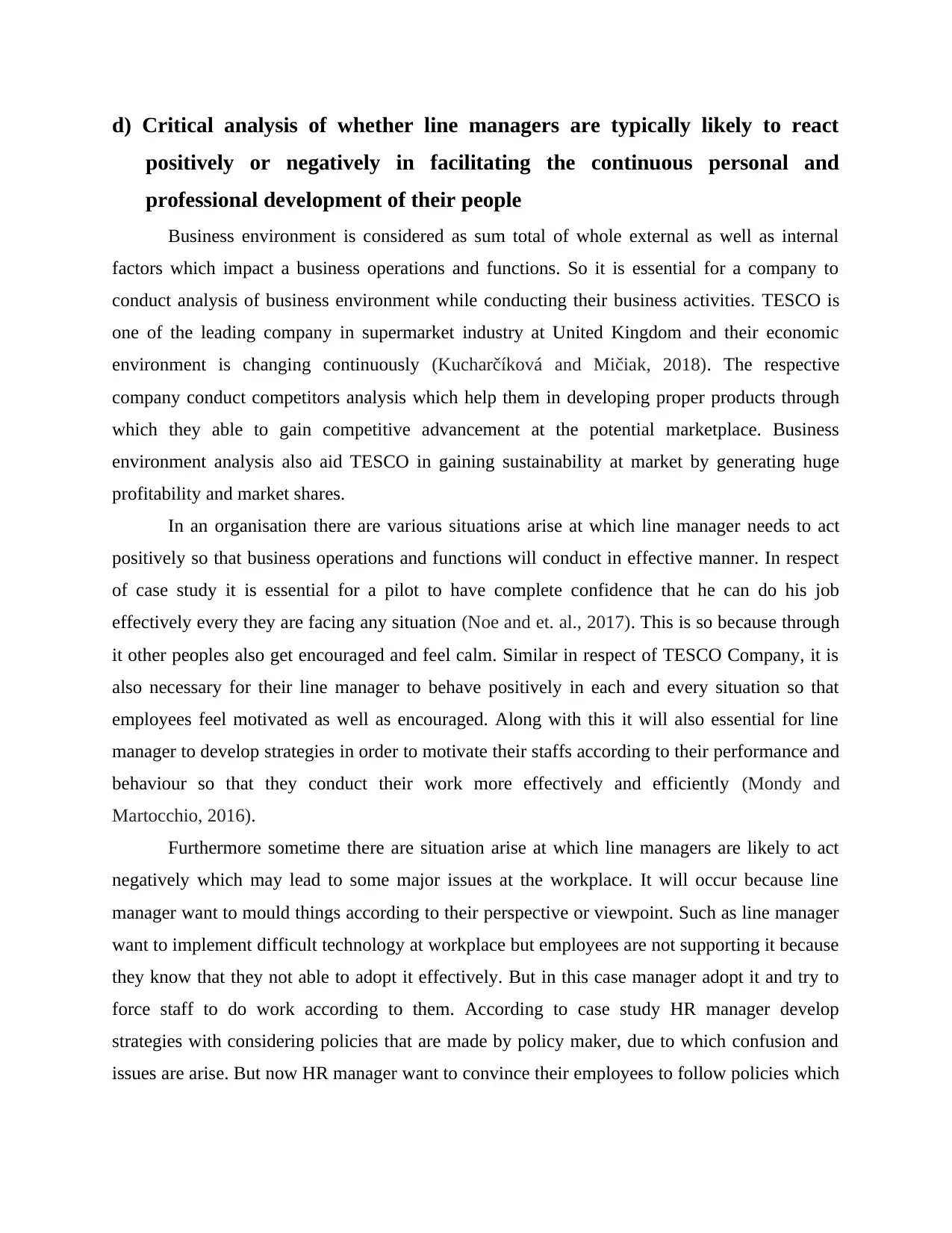
d) Critical analysis of whether line managers are typically likely to react
positively or negatively in facilitating the continuous personal and
professional development of their people
Business environment is considered as sum total of whole external as well as internal
factors which impact a business operations and functions. So it is essential for a company to
conduct analysis of business environment while conducting their business activities. TESCO is
one of the leading company in supermarket industry at United Kingdom and their economic
environment is changing continuously (Kucharčíková and Mičiak, 2018). The respective
company conduct competitors analysis which help them in developing proper products through
which they able to gain competitive advancement at the potential marketplace. Business
environment analysis also aid TESCO in gaining sustainability at market by generating huge
profitability and market shares.
In an organisation there are various situations arise at which line manager needs to act
positively so that business operations and functions will conduct in effective manner. In respect
of case study it is essential for a pilot to have complete confidence that he can do his job
effectively every they are facing any situation (Noe and et. al., 2017). This is so because through
it other peoples also get encouraged and feel calm. Similar in respect of TESCO Company, it is
also necessary for their line manager to behave positively in each and every situation so that
employees feel motivated as well as encouraged. Along with this it will also essential for line
manager to develop strategies in order to motivate their staffs according to their performance and
behaviour so that they conduct their work more effectively and efficiently (Mondy and
Martocchio, 2016).
Furthermore sometime there are situation arise at which line managers are likely to act
negatively which may lead to some major issues at the workplace. It will occur because line
manager want to mould things according to their perspective or viewpoint. Such as line manager
want to implement difficult technology at workplace but employees are not supporting it because
they know that they not able to adopt it effectively. But in this case manager adopt it and try to
force staff to do work according to them. According to case study HR manager develop
strategies with considering policies that are made by policy maker, due to which confusion and
issues are arise. But now HR manager want to convince their employees to follow policies which
positively or negatively in facilitating the continuous personal and
professional development of their people
Business environment is considered as sum total of whole external as well as internal
factors which impact a business operations and functions. So it is essential for a company to
conduct analysis of business environment while conducting their business activities. TESCO is
one of the leading company in supermarket industry at United Kingdom and their economic
environment is changing continuously (Kucharčíková and Mičiak, 2018). The respective
company conduct competitors analysis which help them in developing proper products through
which they able to gain competitive advancement at the potential marketplace. Business
environment analysis also aid TESCO in gaining sustainability at market by generating huge
profitability and market shares.
In an organisation there are various situations arise at which line manager needs to act
positively so that business operations and functions will conduct in effective manner. In respect
of case study it is essential for a pilot to have complete confidence that he can do his job
effectively every they are facing any situation (Noe and et. al., 2017). This is so because through
it other peoples also get encouraged and feel calm. Similar in respect of TESCO Company, it is
also necessary for their line manager to behave positively in each and every situation so that
employees feel motivated as well as encouraged. Along with this it will also essential for line
manager to develop strategies in order to motivate their staffs according to their performance and
behaviour so that they conduct their work more effectively and efficiently (Mondy and
Martocchio, 2016).
Furthermore sometime there are situation arise at which line managers are likely to act
negatively which may lead to some major issues at the workplace. It will occur because line
manager want to mould things according to their perspective or viewpoint. Such as line manager
want to implement difficult technology at workplace but employees are not supporting it because
they know that they not able to adopt it effectively. But in this case manager adopt it and try to
force staff to do work according to them. According to case study HR manager develop
strategies with considering policies that are made by policy maker, due to which confusion and
issues are arise. But now HR manager want to convince their employees to follow policies which
Paraphrase This Document
Need a fresh take? Get an instant paraphrase of this document with our AI Paraphraser
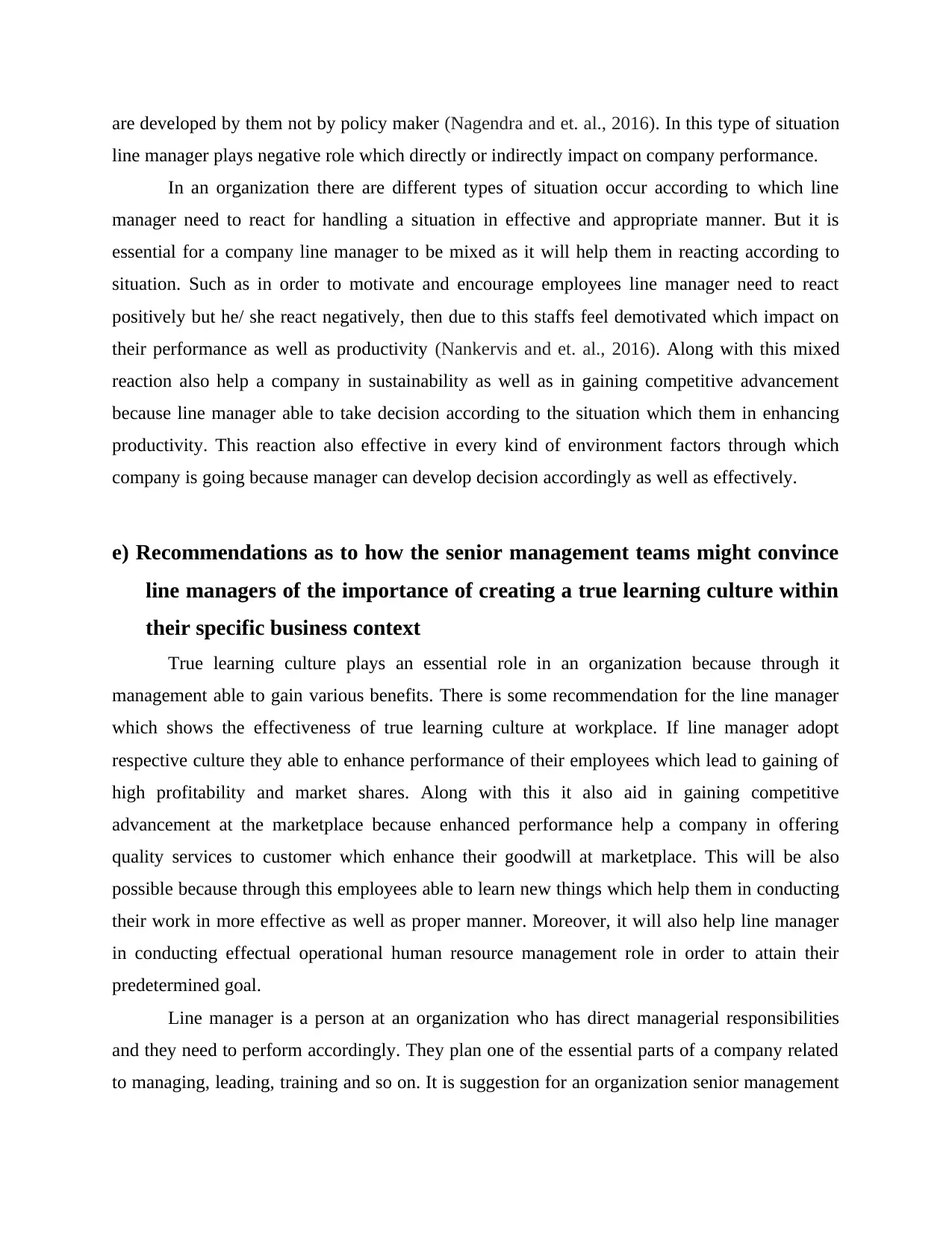
are developed by them not by policy maker (Nagendra and et. al., 2016). In this type of situation
line manager plays negative role which directly or indirectly impact on company performance.
In an organization there are different types of situation occur according to which line
manager need to react for handling a situation in effective and appropriate manner. But it is
essential for a company line manager to be mixed as it will help them in reacting according to
situation. Such as in order to motivate and encourage employees line manager need to react
positively but he/ she react negatively, then due to this staffs feel demotivated which impact on
their performance as well as productivity (Nankervis and et. al., 2016). Along with this mixed
reaction also help a company in sustainability as well as in gaining competitive advancement
because line manager able to take decision according to the situation which them in enhancing
productivity. This reaction also effective in every kind of environment factors through which
company is going because manager can develop decision accordingly as well as effectively.
e) Recommendations as to how the senior management teams might convince
line managers of the importance of creating a true learning culture within
their specific business context
True learning culture plays an essential role in an organization because through it
management able to gain various benefits. There is some recommendation for the line manager
which shows the effectiveness of true learning culture at workplace. If line manager adopt
respective culture they able to enhance performance of their employees which lead to gaining of
high profitability and market shares. Along with this it also aid in gaining competitive
advancement at the marketplace because enhanced performance help a company in offering
quality services to customer which enhance their goodwill at marketplace. This will be also
possible because through this employees able to learn new things which help them in conducting
their work in more effective as well as proper manner. Moreover, it will also help line manager
in conducting effectual operational human resource management role in order to attain their
predetermined goal.
Line manager is a person at an organization who has direct managerial responsibilities
and they need to perform accordingly. They plan one of the essential parts of a company related
to managing, leading, training and so on. It is suggestion for an organization senior management
line manager plays negative role which directly or indirectly impact on company performance.
In an organization there are different types of situation occur according to which line
manager need to react for handling a situation in effective and appropriate manner. But it is
essential for a company line manager to be mixed as it will help them in reacting according to
situation. Such as in order to motivate and encourage employees line manager need to react
positively but he/ she react negatively, then due to this staffs feel demotivated which impact on
their performance as well as productivity (Nankervis and et. al., 2016). Along with this mixed
reaction also help a company in sustainability as well as in gaining competitive advancement
because line manager able to take decision according to the situation which them in enhancing
productivity. This reaction also effective in every kind of environment factors through which
company is going because manager can develop decision accordingly as well as effectively.
e) Recommendations as to how the senior management teams might convince
line managers of the importance of creating a true learning culture within
their specific business context
True learning culture plays an essential role in an organization because through it
management able to gain various benefits. There is some recommendation for the line manager
which shows the effectiveness of true learning culture at workplace. If line manager adopt
respective culture they able to enhance performance of their employees which lead to gaining of
high profitability and market shares. Along with this it also aid in gaining competitive
advancement at the marketplace because enhanced performance help a company in offering
quality services to customer which enhance their goodwill at marketplace. This will be also
possible because through this employees able to learn new things which help them in conducting
their work in more effective as well as proper manner. Moreover, it will also help line manager
in conducting effectual operational human resource management role in order to attain their
predetermined goal.
Line manager is a person at an organization who has direct managerial responsibilities
and they need to perform accordingly. They plan one of the essential parts of a company related
to managing, leading, training and so on. It is suggestion for an organization senior management
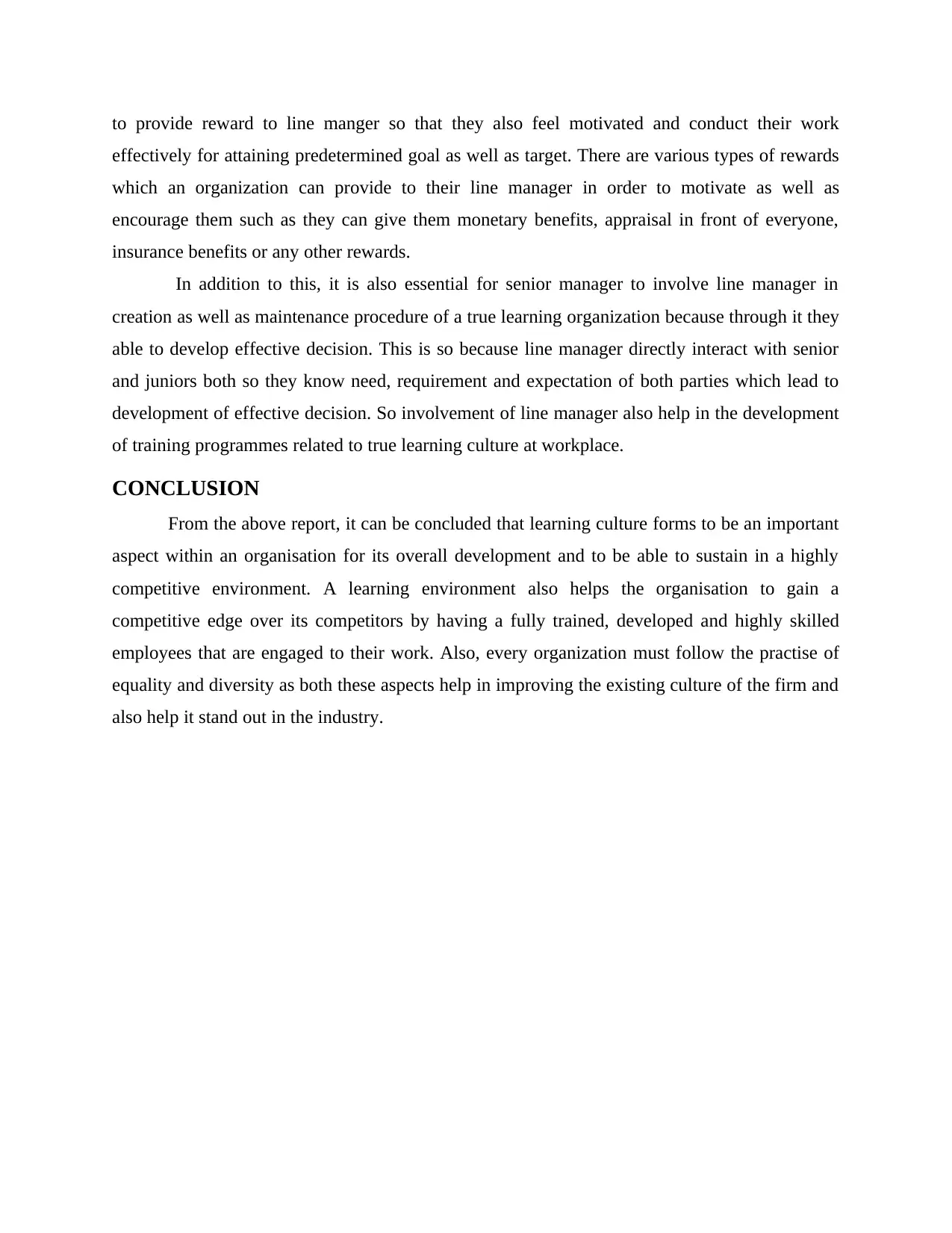
to provide reward to line manger so that they also feel motivated and conduct their work
effectively for attaining predetermined goal as well as target. There are various types of rewards
which an organization can provide to their line manager in order to motivate as well as
encourage them such as they can give them monetary benefits, appraisal in front of everyone,
insurance benefits or any other rewards.
In addition to this, it is also essential for senior manager to involve line manager in
creation as well as maintenance procedure of a true learning organization because through it they
able to develop effective decision. This is so because line manager directly interact with senior
and juniors both so they know need, requirement and expectation of both parties which lead to
development of effective decision. So involvement of line manager also help in the development
of training programmes related to true learning culture at workplace.
CONCLUSION
From the above report, it can be concluded that learning culture forms to be an important
aspect within an organisation for its overall development and to be able to sustain in a highly
competitive environment. A learning environment also helps the organisation to gain a
competitive edge over its competitors by having a fully trained, developed and highly skilled
employees that are engaged to their work. Also, every organization must follow the practise of
equality and diversity as both these aspects help in improving the existing culture of the firm and
also help it stand out in the industry.
effectively for attaining predetermined goal as well as target. There are various types of rewards
which an organization can provide to their line manager in order to motivate as well as
encourage them such as they can give them monetary benefits, appraisal in front of everyone,
insurance benefits or any other rewards.
In addition to this, it is also essential for senior manager to involve line manager in
creation as well as maintenance procedure of a true learning organization because through it they
able to develop effective decision. This is so because line manager directly interact with senior
and juniors both so they know need, requirement and expectation of both parties which lead to
development of effective decision. So involvement of line manager also help in the development
of training programmes related to true learning culture at workplace.
CONCLUSION
From the above report, it can be concluded that learning culture forms to be an important
aspect within an organisation for its overall development and to be able to sustain in a highly
competitive environment. A learning environment also helps the organisation to gain a
competitive edge over its competitors by having a fully trained, developed and highly skilled
employees that are engaged to their work. Also, every organization must follow the practise of
equality and diversity as both these aspects help in improving the existing culture of the firm and
also help it stand out in the industry.
⊘ This is a preview!⊘
Do you want full access?
Subscribe today to unlock all pages.

Trusted by 1+ million students worldwide
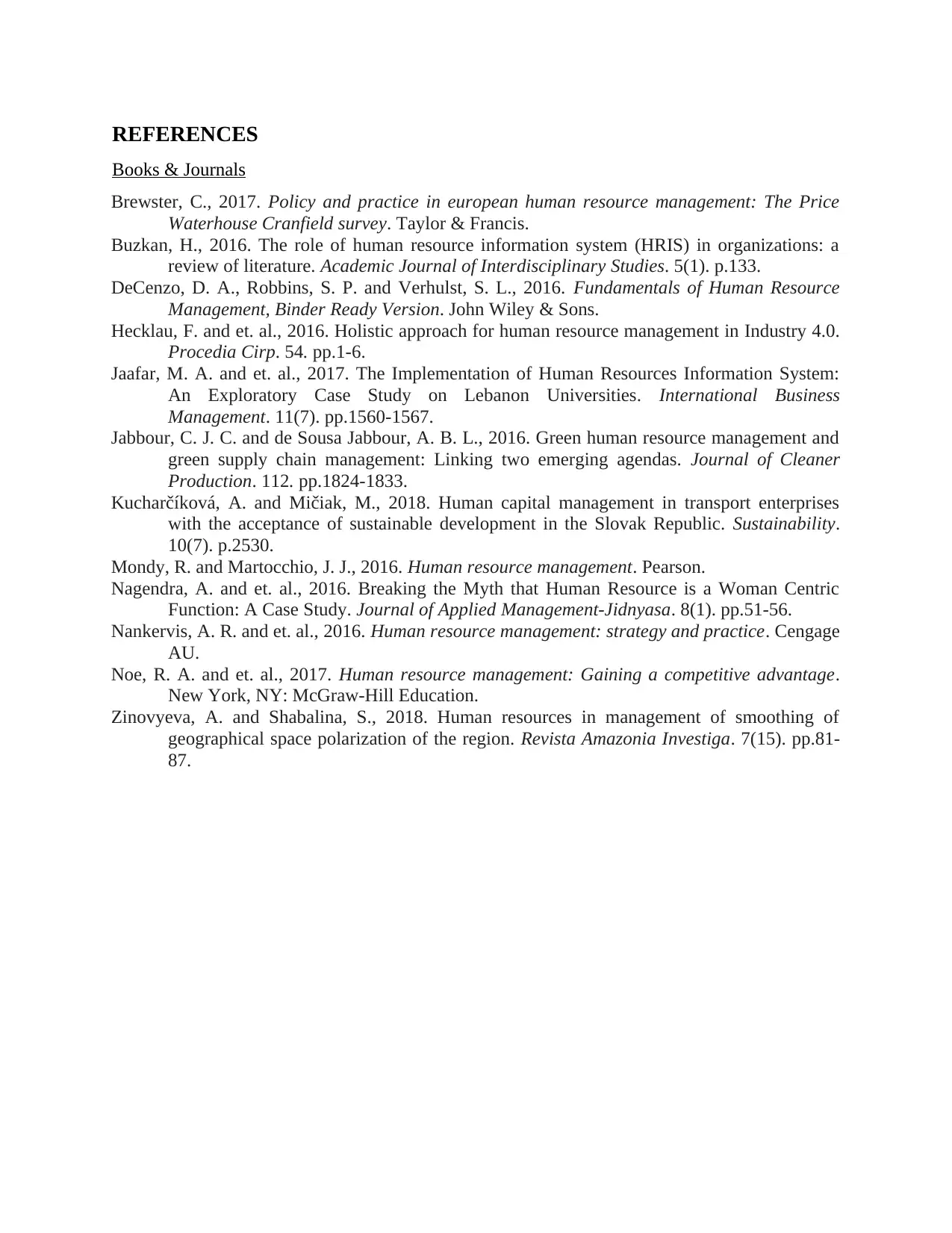
REFERENCES
Books & Journals
Brewster, C., 2017. Policy and practice in european human resource management: The Price
Waterhouse Cranfield survey. Taylor & Francis.
Buzkan, H., 2016. The role of human resource information system (HRIS) in organizations: a
review of literature. Academic Journal of Interdisciplinary Studies. 5(1). p.133.
DeCenzo, D. A., Robbins, S. P. and Verhulst, S. L., 2016. Fundamentals of Human Resource
Management, Binder Ready Version. John Wiley & Sons.
Hecklau, F. and et. al., 2016. Holistic approach for human resource management in Industry 4.0.
Procedia Cirp. 54. pp.1-6.
Jaafar, M. A. and et. al., 2017. The Implementation of Human Resources Information System:
An Exploratory Case Study on Lebanon Universities. International Business
Management. 11(7). pp.1560-1567.
Jabbour, C. J. C. and de Sousa Jabbour, A. B. L., 2016. Green human resource management and
green supply chain management: Linking two emerging agendas. Journal of Cleaner
Production. 112. pp.1824-1833.
Kucharčíková, A. and Mičiak, M., 2018. Human capital management in transport enterprises
with the acceptance of sustainable development in the Slovak Republic. Sustainability.
10(7). p.2530.
Mondy, R. and Martocchio, J. J., 2016. Human resource management. Pearson.
Nagendra, A. and et. al., 2016. Breaking the Myth that Human Resource is a Woman Centric
Function: A Case Study. Journal of Applied Management-Jidnyasa. 8(1). pp.51-56.
Nankervis, A. R. and et. al., 2016. Human resource management: strategy and practice. Cengage
AU.
Noe, R. A. and et. al., 2017. Human resource management: Gaining a competitive advantage.
New York, NY: McGraw-Hill Education.
Zinovyeva, A. and Shabalina, S., 2018. Human resources in management of smoothing of
geographical space polarization of the region. Revista Amazonia Investiga. 7(15). pp.81-
87.
Books & Journals
Brewster, C., 2017. Policy and practice in european human resource management: The Price
Waterhouse Cranfield survey. Taylor & Francis.
Buzkan, H., 2016. The role of human resource information system (HRIS) in organizations: a
review of literature. Academic Journal of Interdisciplinary Studies. 5(1). p.133.
DeCenzo, D. A., Robbins, S. P. and Verhulst, S. L., 2016. Fundamentals of Human Resource
Management, Binder Ready Version. John Wiley & Sons.
Hecklau, F. and et. al., 2016. Holistic approach for human resource management in Industry 4.0.
Procedia Cirp. 54. pp.1-6.
Jaafar, M. A. and et. al., 2017. The Implementation of Human Resources Information System:
An Exploratory Case Study on Lebanon Universities. International Business
Management. 11(7). pp.1560-1567.
Jabbour, C. J. C. and de Sousa Jabbour, A. B. L., 2016. Green human resource management and
green supply chain management: Linking two emerging agendas. Journal of Cleaner
Production. 112. pp.1824-1833.
Kucharčíková, A. and Mičiak, M., 2018. Human capital management in transport enterprises
with the acceptance of sustainable development in the Slovak Republic. Sustainability.
10(7). p.2530.
Mondy, R. and Martocchio, J. J., 2016. Human resource management. Pearson.
Nagendra, A. and et. al., 2016. Breaking the Myth that Human Resource is a Woman Centric
Function: A Case Study. Journal of Applied Management-Jidnyasa. 8(1). pp.51-56.
Nankervis, A. R. and et. al., 2016. Human resource management: strategy and practice. Cengage
AU.
Noe, R. A. and et. al., 2017. Human resource management: Gaining a competitive advantage.
New York, NY: McGraw-Hill Education.
Zinovyeva, A. and Shabalina, S., 2018. Human resources in management of smoothing of
geographical space polarization of the region. Revista Amazonia Investiga. 7(15). pp.81-
87.
1 out of 10
Related Documents
Your All-in-One AI-Powered Toolkit for Academic Success.
+13062052269
info@desklib.com
Available 24*7 on WhatsApp / Email
![[object Object]](/_next/static/media/star-bottom.7253800d.svg)
Unlock your academic potential
Copyright © 2020–2026 A2Z Services. All Rights Reserved. Developed and managed by ZUCOL.





